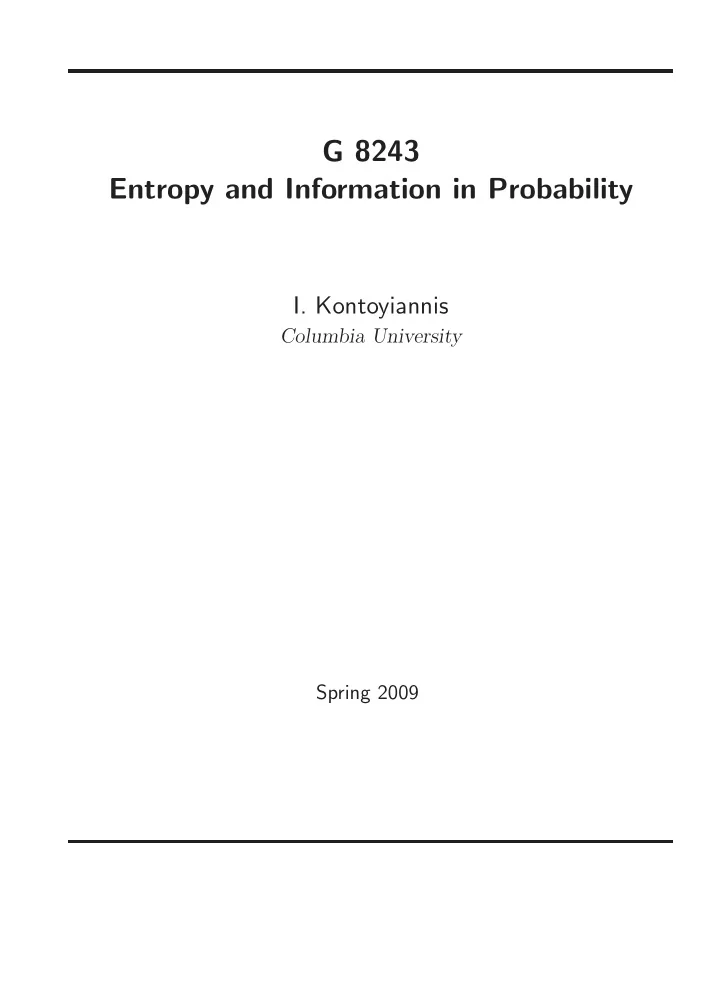

G 8243 Entropy and Information in Probability I. Kontoyiannis Columbia University Spring 2009
What is Information Theory? Born in 1948, it is the mathematical foundation of communication theory; it quantifies the notion of “information” Three Basic Problems: Lossless data compression : = remove redundancy Lossy data compression : remove redundancy + “noise” Error correction : add redundancy to battle noise
What is Information? It is what remains in a “message” after all redundancy has been removed E.g., 0 0 0 0 0 0 0 0 0 0 0 0 0 0 0 0 0 0 0 0 contains “no” information, whereas the random sequence 0 0 1 0 1 0 1 1 1 1 0 1 0 0 1 0 0 0 1 0 contains “maximal” information ≈ 20 bits ❀ So we can think of the “ amount of information ” in a message as the “ amount of randomness ” in it In information theory, as well as in physics, this is called the entropy
Relationship with Other Fields 1. It is based on (and uses the tools of) probability 3. It is mostly motivated by (and often is considered as part of) Engineering
Rudolf CLAUSIUS (1822 – 1882) Father of Entropy in physics Prussian (now Poland) physicist who: Founded modern thermodynamics Formulated the concept of entropy Stated the first and second laws of thermodynamics
Josiah Willard GIBBS (1839 – 1903) First (?) important American physicist Born and died in CT, USA; also lived in Europe Co-founder of statistical mechanics Established the mathematical foundation of statistical mechanics
Ludwig BOLTZMANN (1844 – 1906) Austrian physicist who: ❀ Gave the first formula for the entropy ❀ Derived the 2nd law of thermodynamics from the principles of mechanics (around 1890) ❀ Invented statistical mechanics (indep’ly of Gibbs) ❀ Derived Maxwell-Boltzmann distr for an ideal gas (around 1871)
Ludwig BOLTZMANN (1844 – 1906) Boltzmann: Was one of the early big proponents of the atomic theory of matter – for that he was often ridiculed Had many enemies in the scientific establishment Depressed and in bad health he hanged himself (while on vacation with his wife and daughter)
Ludwig BOLTZMANN (1844 – 1906) Very shortly after his suicide in 1906, experiments verified his life’s work on the atomic structure of matter . . .
Albert EINSTEIN (1879 – 1955) “[A law] is more impressive the greater the simplicity of its premises, the more different are the kinds of things it relates, and the more extended its range of applicability. Therefore, the deep impression which classical thermodynamics made on me. It is the only physical theory of universal content, which I am convinced, that within the framework of applicability of its basic concepts will never be overthrown.” Albert Einstein, quoted in M.J. Klein, (1967).
Sir Arthur Stanley EDDINGTON (1882 – 1944) Famous British physicist and astronomer “The law that entropy always increases – the second law of thermodynamics – holds I think, the supreme position among the laws of Nature. If someone points out to you that your pet theory of the universe is in disagreement with Maxwell’s equations – then so much the worse for Maxwell’s equations. If it is found to be contradicted by observation – well these experimentalists do bungle things sometimes. But if your theory is found to be against the second law of thermodynamics, I can give you no hope; there is nothing for it but to collapse in deepest humiliation.”
1948: Claude Shannon and The Birth of Information Theory
Claude E. SHANNON (1916 – 2001) A visionary engineer and mathematician, whose work had an enormous impact on 20th century technology, and on our society at large
Andrei N. KOLMOGOROV (1903 – 1987) ❀ One of the greatest mathematicians of the 20th century ❀ Made fundamental contributions to MANY areas of mathematics ❀ E.g., he founded modern probability and the modern study of turbulence! ❀ One of the early proponents of information theory
Andrei N. KOLMOGOROV (1903 – 1987) “Information theory must precede probability theory and not be based on it. [...] The concepts of information theory as applied to infinite sequences give rise to very interesting investigations, which, without being indispensable as a basis of probability theory, can acquire a certain value in the investigation of the algorithmic side of mathematics as a whole.” A.N. Kolmogorov, 1983.
Recommend
More recommend